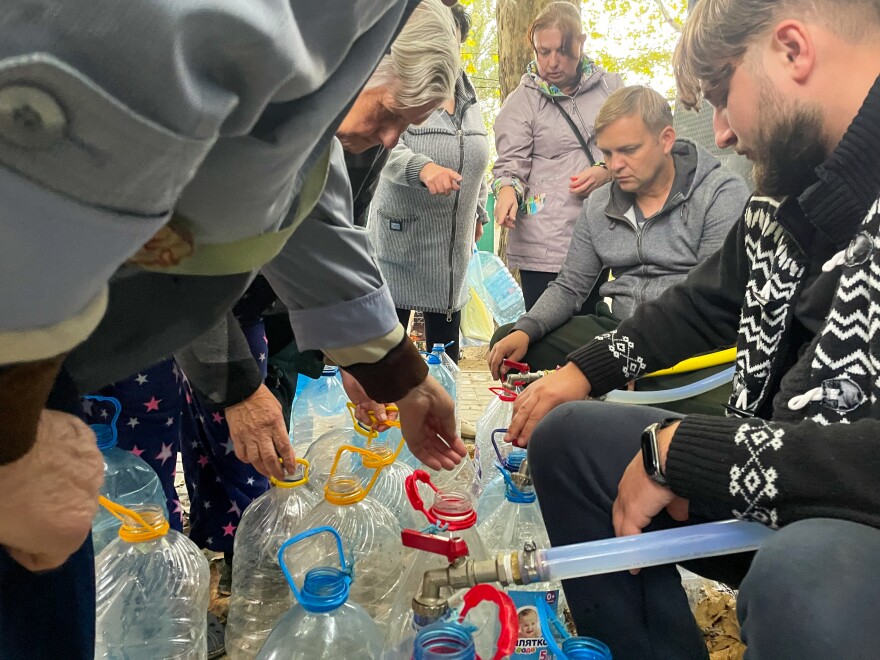MYKOLAIV, Ukraine — The southern Ukrainian city of Mykolaiv is surrounded by water. The Buh River wraps around the shipbuilding port before spreading into the Black Sea. But ever since Russian missiles ruptured the two pipelines that supplied the city's municipal water system, on the same day in mid-April, Mykolaiv's residents have struggled to access clean water.
Ukrainian officials say the attack was a deliberate and successful attempt to cut off the city's water supply. The massive pipes carried water more than 40 miles from the Dnipro River into the city's pumping stations.

The problem Mykolaiv faces now is that those pipelines stretch across territory that Russian forces occupied soon after their February invasion of Ukraine. Russia still controls that area, making it impossible for municipal workers to repair the ruptured conduits.
Prior to the war, Mykolaiv was a city of roughly half a million people. Officials now estimate that about half that number remain. For the past five months, residents have been collecting clean water from tanker trucks and water distribution points set up by the city and the International Committee of the Red Cross.
The new normal in Mykolaiv
At a series of taps set up on a sidewalk in downtown Mykolaiv, 58-year-old Natalie Rosental is strapping two large plastic jugs of water to the rack of her 10-speed bicycle.

Rosental says she rides just over a mile each day to fetch water for her family. "I'm used to it!" she says cheerfully. "It's good exercise."
Most businesses have shut down in Mykolaiv. Missiles strike the city nearly every day. Getting water has become a daily chore, but Vitali Kim, the regional military administrator, says people simply put up with it.
"We don't have a choice," he says. "We are trying to live our common life in such difficult circumstances."

The ICRC hauls water to several sites in tanker trucks and then stores it in galvanized tanks. Residents of all ages bring plastic jugs of all sizes to fill at the taps. There are young boys. Old women. Men load jerrycans of water into cars.
There are now more than 70 clean water points set up in the streets of Mykolaiv. One of the largest ICRC stations has 10 spigots. Others are just single hoses dangling off the back of tanker trucks.

No real alternatives
Borys Dudenko, the general director of the Water Supply Company of Mykolaiv, says fixing the pipes that the Russians blew up back in April would be relatively easy — but his maintenance workers can't cross the front lines to do the work.
"We tried to reach an agreement to allow us to repair the water supply lines," he says. "We asked the Red Cross, the United Nations, to participate in negotiations with both sides. But unfortunately, there were no negotiations. Everything failed."
Concerned about the public health risk of not even having water for toilets, city officials have been desperate for a solution. Dudenko says building new pipelines from, say, the Buh River on the west side of the city was an appealing prospect, but it would be expensive and take months. They didn't have the money or the time.

They decided instead that their best option was to tap into an existing industrial pipeline that was pulling water out of an estuary on the Black Sea.
"The amount of salt in this water, however, is almost like in the real sea," he says. "That's why we have many problems with this water. We call it 'aggressive water.' It damages steel pipes, pumps and other devices."
This "aggressive water" that now flows through the city's pipes is yellow, salty and smells a bit like a swamp. Residents say they don't even wash their dishes with it.
Relying on the military's southern offensive
Dudenko says the water company is in a difficult position. Ukraine's southern military offensive may soon wrest back control of the pipeline. But if it doesn't, Mykolaiv is facing a winter with people fetching and lugging water through the city's frozen streets. And Dudenko says every day the salt water runs through Mykolaiv's system, it eats away at the pumps and pipes.
He says they're studying building an alternative viaduct, while hoping Ukraine's military advance will make that unnecessary.
And not everyone is as cheerful about Mykolaiv's water situation as Natalie Rosental, who views it as exercise.

"The water is salty and it smells bad," says Galina Teliukh, describing the water that comes out of her taps. "We can't even wash our clothes in it."
Teliukh is carrying four bottles of drinking water that she just got from a humanitarian aid distribution hub. Teliukh's apartment building had been hit the night before by a Russian missile, killing one resident.

"I wish them all to die, all Russians," she says. She suggests that poisoning might be a good method.
"I'm so angry with [Russian President Vladimir] Putin," she says. "Why do the Russian people let him do this to us?"
Copyright 2022 NPR. To see more, visit https://www.npr.org.




